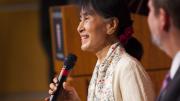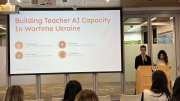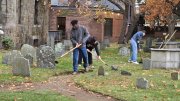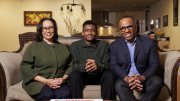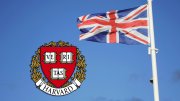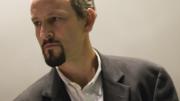Nobel laureate Daw Aung San Suu Kyi—founder and chair of Burma’s National League for Democracy (NLD), and now a member of that nation’s elected parliamentary minority—spoke at the Harvard Kennedy School Thursday evening. Making use of the setting—a school of policy and democratic governance—she devoted her Godkin Lecture to a brisk, 20-minute talk on what it means to prepare a people to be free citizens after they have lived for half a century under an oppressive military dictatorship. (Aung San Suu Kyi experienced that oppression personally during 15 years of house arrest in Rangoon between 1989 and 2010—periods of detention that separated her from her young sons and from her husband, Michael Aris, during his terminal cancer and death in 1999.) Updated September 28: A video recording of the Kennedy School event is now available at the Institute of Politics website.
Her Harvard appearance came during an eventful part of her extended trip through the United States. (Read the earlier report about the trip and Aung San Suu Kyi’s connections to Harvard—her late husband taught here while she was first under house arrest, and Kennedy School scholars have recently begun efforts to address her nation’s troubled economy.)
- In New York, her country’s president, former general U Thein Sein, told the United Nations General Assembly that Burma (Myanmar) had taken permanent steps toward democracy—and he publicly recognized Aung San Suu Kyi and mentioned her Nobel Prize in remarks that were broadcast live in their nation, saying: “As a Myanmar citizen, I would like to congratulate her for the honors she has received in this country in recognition of her efforts for democracy.” Aung San Suu Kyi’s trip has been carefully planned so as to complement, rather than overshadow, Thein Sein’s.
- His speech followed a meeting with U.S. Secretary of State Hillary Clinton, who announced that U.S. sanctions on imports from Myanmar would be eased, as Aung San Suu Kyi had advocated.
- And before arriving in Cambridge, Aung San Suu Kyi spoke as a Chubb Fellow at Yale, where she focused on her country’s pursuit of the rule of law (see report below).
“You Will Be the Equal of the President Himself”
David Ellwood, dean of the Kennedy School, opened the forum, thanking the scholars from the school’s Ash Center who have pioneered policy research on the recently liberalizing Burma—notably, Anthony Saich and Thomas Vallely. He noted that the Godkin Lecture, established in 1903, was devoted to addressing the “essentials of free government and the duties of the citizen,” and so perfectly suited the evening’s honored guest.
President Drew Faust then outlined Aung San Suu Kyi’s quarter-century of advocacy for democratic reform and human rights in her country, and spoke of her quality of “serene tenacity.” Faust referred to Aung San Suu Kyi’s Nobel address, delivered this past summer in Oslo—21 years after the Peace Prize was awarded to her in absentia—where she said of the conditions of oppression, “war is not the only arena where peace is done to death.” Faust then recounted meeting Aung San Suu Kyi in Oxford in June, where both received honorary degrees (again, in the latter case, awarded in 1993 but conferred only now), and cited passages from that address, on higher education (excerpted here). The president concluded by welcoming the honored guest, “joining us as a free woman,” to another institution committed to revealing human potential through higher education.
Aung San Suu Kyi noted how touching it was to cross paths in Oxford and on Faust’s home ground, finding world institutions of higher education linked to one another, and said she would like to see that connection “extended to our country in the course of time.”
Then she turned to her primary subject. “When you have lived under a dictatorship for a long time,” she told listeners, “you do not know what it means to live in a free society.” And so that became the NLD’s urgent work during the election in which the party participated this past April—explaining to an oppressed people “the basics of a democratic practice.”
Change has begun in Burma, she said, “But we have not yet seen the fruits of this change.” (The NLD holds a small minority of seats in the parliament, and it is thought that some members of the past military government remain opposed to the current steps toward liberalization.) The problem, she said, lay not with the institutions of democracy, but with preparing people, who have no experience in the role, to be citizens. She described a pervasive sense of fear, of people who are still afraid to visit relatives who were punished for being politically active. The Burmese people, she said, had to learn to be truly free citizens by acting that way, and taking responsibility for their actions.
During the six-week campaign for the parliamentary by-elections held in April, she said the NLD’s message was as simple as can be: there will be an election; you have the right to vote; it is important to exercise that right, and also a duty. “On the day of the elections,” she said, the NLD candidates stressed, “You will be the equal of the president himself,” each exercising a single vote. It was their responsibility to cast their vote on the basis of what would be best for their constituency, after giving due thought to what that best interest was.
She spoke simply and directly. Her background was surely not the deplorable state of participation in U.S. elections, but rather the Burmese people’s devastating experience of elections. In 1990, the NLD won 82 percent of seats in parliament, she noted—with the result that party leaders were imprisoned, and the military government never recognized the election results. Although the NLD was not officially outlawed, “People became afraid to be seen being in contact with our party”—the only viable party for the next two decades. They saw any political contact as dangerous.
Thus the campaign had to assure voters that their ballot was exercised in secret, and to educate them to vote accurately. The result was a “tremendous success,” Aung San Suu Kyi said, with high turnout and NLD victories in 43 of 44 contested seats.
After the campaign, she said, the NLD took advantage of its victory, and the greater freedom to contact citizens in their villages and townships, to begin civic education from the ground level. To help an impoverished citizenry in need of roads, clean water, electricity, access to education, and healthcare, the party has begun working with villagers, encouraging them to organize themselves to install such basic facilities as community wells for drinking water. By requiring the citizens to choose an accessible, public site and form committees to assume responsibility for maintenance before the NLD would pay to install a well, she said, “the villagers realize they have to be involved in” community life.
Such steps are simple, she said, but each one “makes a difference” in creating citizens—a remarkable change for people who, under authoritarian governance, had never been treated as adults. It was a lesson that students and citizens in established democratic societies might take for granted, she noted.
Through such measures, Aung San Suu Kyi said, “We have just started out on the road to shaping our nation” as the Burmese people want it to be. Burma has the “advantage of coming to democracy late,” she said, so it can learn from the mistakes of other nations. Citizens of a democracy, she said, must take responsibility for their actions, or they “cannot be said to be free. “ In this sense, “Democracy is a tough choice”—one the Burmese are pursuing to “become a freer, more responsible people” than their government of the past 50 years has permitted.
From the Floor
In questions from the floor, moderated by Dean Ellwood, students and others posed elemental problems.
- How had she had the courage to remain strong during her long detention? Aung San Suu Kyi said the key was to “learn not to think of yourself” but to focus on colleagues in common struggle. “It is required of you to keep strong,” she said.
- Why had the Burmese chosen to pursue democracy? She said her people “don’t know much about democracy, but we know we don’t like the military regime” and lives of oppression and fear. “People are tired of living under dictatorship, of being poor, of being afraid.”
- Did she regard herself as an icon of hope in Burma, or otherwise? Aung San Suu Kyi said bluntly, “I’ve always thought of myself as a politician.” In 1988, she helped found the NLD, a political party, so “That’s politics.” In contrast, she said, “Icons do nothing but sit there.” She much preferred to be thought of as “a hard worker,” intent during her detention on keeping herself fit and ready for the day when she could resume political life.
- What could Burma learn from other countries in transition to democracy? She said, above all, there was “the value of negotiations.” Burma is culturally disinclined to negotiate compromises, she said, because superior people resist losing face to perceived inferiors. She said the culture had to change to permit negotiation and the arrival at “intelligent compromise.”
- Should Burma have a truth commission to come to terms with its political past, as Brazil is now doing? Aung San Suu Kyi said she had heard strong arguments against the idea, from fellow Nobel laureate Ellen Johnson Sirleaf, who felt the idea worked poorly in Liberia—allowing those who committed atrocities to testify about them without consequences. Rather than retribution, Aung San Suu Kyi said, she felt attracted to Nobel laureate Desmond Tutu’s concept of “restorative justice.” And as for herself, she did not feel “vengeful” toward her Burmese captors; she was kept under house arrest, but not badly treated; colleagues who were imprisoned and badly treated, she acknowledged, might feel otherwise.
- And finally, how did she feel, in 1998, when she was not free to travel (lest she be exiled from Burma) to join her husband, then dying in England? Said Aung San Suu Kyi, “I never thought there was a choice.” She would never leave Burma, she said, so long as one person there believed in democracy. That choice was made when she entered politics in 1988 (following the regime’s massacre of citizens in the streets of Rangoon)—and her husband was “very understanding.”
When Law Is Used “To Protect the State Against ‘Destructive Elements’”
Earlier in the day, Aung San Suu Kyi spoke at Yale, as a Chubb Fellow. She addressed the importance of establishing the rule of law in Burma as part of restoring that nation’s democratic governance—which was usurped by a military coup in 1962.
On July 20, 1989, she recalled, after her National League for Democracy had campaigned across Burma, police officers and uniformed soldiers poured into her house compound in Rangoon, rounded up her colleagues (who were then imprisoned without trial), and read a detention order subjecting her to house arrest under Section 10 of Burma’s laws—language meant to “protect the state against ‘destructive elements’” without trial. The language of the law called for her detention to be reviewed every six months, and to be limited to three years—but she was not released until 1995. (She was subjected to house arrest twice more, for a total of 15 years, before her most recent release in late 2010.)
As she listened to the radio, she recalled, she learned of supporters being arrested under Section 5 of the law, enacted in 1950 as an emergency measure against insurgencies wracking Burma at the time. In its late 1980s application, Aung Sun San Kyi said, she and colleagues came to think of it as the “I can’t bear you law.” Those rounded up were ultimately jailed for terms as long as 18-plus years, although the law itself limited such sentences to 5 years.
Experiences such as these, she said, made her realize that there is no rule of law in Burma, and that law is used by rulers for their own ends, not to protect citizens. She cited other legal provisions that made political gatherings unlawful—also used against her supporters.
When she was first freed in 1995, Aung San Suu Kyi said, she determined that the National League for Democracy needed a legal-aid committee—not because she expected to be able to win any cases, but to give League supporters the sense that they had not been abandoned, and to put the cases on the record for the future. Given that supporters were arrested for such acts as distributing copies of the Universal Declaration of Human Rights (Burma was a signatory, she noted), having that kind of mechanism in place to defend supporters was essential.
In the elections held this past April, the National League for Democracy won 43 of 44 seats it contested, campaigning on a three-part platform of rule of law; an end to Burma’s long-running ethnic conflicts; and amending the constitution written by the military regime. As she knew from experience, Aung San Suu Kyi said, being subject to the “rule of unjust law” meant that her people were “ruled unjustly from day to day.” The League holds a small minority of seats in the parliament, she observed, and so cannot immediately effect change, but it seeks to remove Sections 5 (which, she said, results in imprisonment for those found acting in any way “to diminish the love of the people for the government”) and 10 from Burmese law. She is now chair of the parliamentary committee for “rule of law and tranquility,” and has sought guidance from retired judges and lawyers on how to move toward the rule of law, overhaul a corrupt judiciary (whose members were told what sentences to hand out by the military government), and, in general, to move from the prevailing system where “the law only worked for those who are in power.”
She cautioned outside observers against concluding that Burma’s recent movement toward civilian government, or her election, meant that the country had realized its democratic aspirations—far from it, in fact. Only “rule of law will engender rule of law,” she said, and only then can one say “this process of democratization has succeeded.” “We have been given the opportunity to achieve a breakthrough,” she said, but are far from realizing it. “There is no such thing as an ‘inevitable process’” of democratization, she observed, noting that Burma had had a functioning democracy and liberty until the 1962 military coup.
To that end, she sought help: guidance from well-trained lawyers and judges; establishment of good law schools at Burma’s universities; and contact between reformed members of the Burmese judiciary (she earlier said reformers would have to “impose rule of law on the judiciary themselves”) and the established, effective judiciaries of the world’s democracies. “There is so much that we need,” she emphasized, including broad education on both rights and responsibilities within a democratic society. In her experience since the military suppressed Burma’s democracy, she said, “We have never received justice from the authorities.” Her society is one where “the law can be used in any way the authorities please.”
In a question-and-answer session moderated by Yale president Richard Levin, he asked whether Burma could be guided by other countries’ transitions to democracy—in Eastern Europe or Latin America, for instance. Aung San Suu Kyi responded that in Indonesia and South Africa, the focus on the rule of law had been productive—but she noted, starkly, that South Africa, even under its repressive apartheid system, had a working judiciary. That nation, she said, “had an easier job than we are going to have in Burma” because her nation’s judiciary and rule of law are “far weaker.”
When he introduced her, Levin noted that Yale would immediately undertake modest steps to facilitate the reforms now under way in Burma, including:
- Stepping up admissions recruiting, and underscoring Yale’s full financial aid for undergraduates, including international students, for families with incomes of $65,000 or less.
- Bringing Burmese high-school teachers and principals to New Haven to let them know about Yale, equipping them in turn to encourage students’ interest in United States educational institutions more generally.
- Through its South Asian Studies Council, supporting publication of a scholarly journal on Burma, as a successor to the Journal of the Burma Research Society, suppressed by the military regime in the 1970s.
